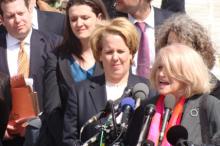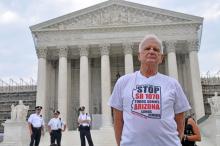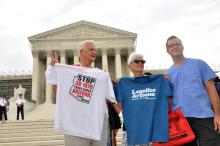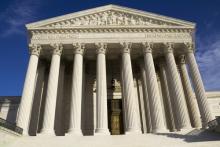SCOTUS

Ryan Anderson has planted himself on arguably the most unpopular stance for his generation: opposing gay marriage.
At 31, Anderson has become one of the leading voices in the
“millennial” generation against the legalization of gay marriage. With the upcoming Supreme Court decisions on gay marriage, his ideas have been circulated in conservative circles, giving him an influence beyond his years.
“Debating marriage is probably not what I would have chosen,” said Anderson, a fellow at the conservative Heritage Foundation in Washington. “It’s the question that most likely gets you kicked out of your law firm.”

In nearly two hours of arguments on Wednesday, the Supreme Court heard many of the expected cases for and against recognizing gay marriage: that refusing to do so is blatant discrimination, that gay marriage is a social experiment that the court should not preempt, that Washington has no role in state marriage laws.
Yet it was arcane arguments over matters of legal standing that seemed to most animate the justices, reflecting what seemed to be a desire to find a way for the court to sidestep a definitive up-or-down ruling on one of the most divisive social issues.
In short, the court — particularly its conservative majority — seemed to ask why they should hear a second gay marriage case in as many days, particularly one in which the government supports the lower court’s ruling. And the answer to that question will go a long way toward determining the outcome of a spirited national debate.
From The Daily Show with Jon Stewart:
"The Supreme Court rules on the Affordable Care Act, and CNN races with Fox News to see which news organization will be the first to report the great decision."

Religious groups and social conservatives are reacting to the Supreme's Court's historic ruling that largely upholds President Obama's health care law, the Affordable Care Act.
Sr. Carol Keehan, president and chief executive officer of the Catholic Health Association of the United States (CHA):
"We are pleased that, based on an initial read of the ruling, the ACA has been found constitutional and will remain in effect. CHA has long supported health reform that expands access and coverage to everyone. We signed onto amicus briefs encouraging the Court to find in favor of the ACA’s individual mandate and the Medicaid expansion. As the ruling is examined, Catholic-sponsored health care providers will continue to lead health care transformation — finding new and better ways to provide compassionate, high-quality care while strengthening the communities we serve."
The Catholic Bishops of the United States urged Congress and President Obama to repair, not replace, the health care law so that it covers immigrants, includes stronger conscience protections, and ensures that it will not fund abortions -- something the law specifically bars:
"Following enactment of ACA, the U.S. Conference of Catholic Bishops (USCCB) has not joined in efforts to repeal the law in its entirety, and we do not do so today.The decision of the Supreme Court neither diminishes the moral imperative to ensure decent health care for all, nor eliminates the need to correct the fundamental flaws described above.We therefore continue to urge Congress to pass, and the Administration to sign, legislation to fix those flaws."

In 2009, during the debate over health care, I devoted a good deal of my time arguing in favor of President Obama’s efforts to provide some form of universal health care to the people of the United States. I argued that universal health care is a human right. I argued that providing a way for people to get medical care without the worry of going bankrupt or of having to be shackled to a job because they or someone in their family needs health care is a matter of establishing justice in our country. It is a matter of distributive justice.
In the Supreme Court decision upheld the Affordable Care Act (ACA a.k.a. Obamacare) Chief Justice John Glover Roberts, Jr., writing for the majority of the court, in effect said that the act is constitutional because Congress has the power of taxation. He quotes Benjamin Franklin: “Our Constitution is now established . . .but in this world nothing can be said to be certain, except death and taxes.”
Opponents of the ACA argued that the individual mandate that requires people to buy health insurance was unconstitutional. They argued that it was an overreach of governmental power to require someone to buy something. Supporters of the ACA argued that the individual mandate was constitutional under the powers granted to Congress under the commerce clause and because Congress has the power of taxation. The penalty imposed on people who do not buy health insurance will be collected by the IRS when a person files h/er income taxes. The penalty or tax only applies to people who can afford to buy health insurance but who choose to not buy it.
The chief justice’s opinion does not judge the morality of the law. Roberts does not speak of the Universal Declaration of Human Rights and the goals it sets for the entire human community, including universal health care. He does not speak of the concepts of liberty and justice for all, that the government has an obligation to its citizens to make health care something that is available to all.

Today, in a long and complicated ruling, the U.S. Supreme Court upheld the Affordable Care Act. This is an important victory for millions of uninsured people in our country and ultimately a triumph of the common good. Children, young adults, and families will have access to basic health care, adding security and stability to their lives.
While I believe the decision is reason to celebrate, it doesn’t mean that this legislation is somehow the flawless will of God; it is an important step in expanding health care coverage and reducing long term costs, but it still is not perfect and more work is yet to be done.
Many Christian organizations and people of faith were involved in advocating for expanded insurance coverage, specifically for low-income and vulnerable people. And that’s what we can never forget: our involvement in the world of politics is always based in and motivated by the way that it affects the lives of real people, and especially poor people.
This last week, I’ve watched the endless political pre-coverage of the Supreme Court decision, and I was struck first by the poor quality of the questions being asked. Now that the decision has been made, the pontification is just as bad. We need to be focused on those who are left out and left behind, not who is up or down in politics and the polls.

In a widely anticipated and extremely consequential decision, the Supreme Court ruled today in a 5-4 decision that President Barack Obama’s chief domestic achievement, the Affordable Care Act, is constitutional.
The main challenge to the law had focused on the “individual mandate,” which required people to purchase insurance or pay a fine. In its ruling, the Court upheld the mandate under the taxing power given to Congress in the Constitution.

According to SCOTUS Blog, the Supreme Court has upheld the constitutionality of the Affordable Care Act limiting only the Medicaid provision, with Chief Justice John Roberts siding with the majority.
Read the full decision HERE.
Stay tuned to Sojourners' blog for additional comments and analysis of the decision.

Both sides have been spinning and claiming victory in Monday’s Supreme Court ruling on Arizona’s now infamous immigration legislation SB 1070. Not surprisingly the Court ruled on the side of federal supremacy, striking down three out of four measures in the Arizona legislation, but upholding the right of local law enforcement to demand “papers” if they believe someone is undocumented.
Since the 2008 failure to move comprehensive immigration reform and last year’s disappointment on the Dream Act, the immigration reform movement has had trouble getting any “air-time” in a country that is rightfully concerned about financial recession. However, the 2012 election and a strategically placed Hispanic electorate in key swing states has candidates talking about immigration anew since the GOP primaries.
There has for some time been a larger strategy at play here that I will bluntly call “evil.”
For CNN, Allison Brennan writes:
"After two years of protests, boycotts and lawsuits over Arizona's immigration law, Monday's Supreme Court decision leaves the state of immigration reform almost unchanged with states frustrated and Congress avoiding the debate. "I would guess [Congress] won't touch this with a 10-foot pole until after they come back after the election," Charles H. Kuck, managing partner at Kuck Immigration Partners in Atlanta, told CNN."
Read her full analysis here

Today, as I stood on the steps of the U.S. Supreme Court eagerly following Arizona’s SB 1070 ruling, I had the opportunity to interview some advocates of the immigration reform movement.
The message that seemed to resonate among those present was that athough three of the four provisions were struck down, the fourth —the so called “show me your papers” clause — is very harmful to communities. It allows racial profiling on the basis of appearance. Even though there might be limits on how this last provision is implemented, those who feel they have the legal authority to enforce laws might feel compelled to use this piece as an excuse to discriminate.

Today the Supreme Court struck down three central provisions of Arizona’s controversial anti-immigrant law, SB 1070. Attempts by Arizona to force immigrants to carry identification, create legal penalties for undocumented workers seeking employment, or detain individuals solely based on suspicions about their immigration status were ruled to interfere with the federal government’s right and responsibility to set immigration policy.
The Court let one section, known as 2(B), to stand, which allows law enforcement to check the immigration status of individuals apprehended for non-immigration offenses, if law enforcement has a “reasonable suspicion” that the person violated U.S. immigration laws in entering the country. (Read more on concerns about the racial profiling measure HERE.)
The Supreme Court on Monday struck down large portions of the controversial Arizona anti-immigrant law SB 1070.
In the decision—with Justice Sonia Sotomayor in favor—the Supreme Court struck down three major pieces of the legislation including provisions that made it illegal for immigrants to fail to carry immigration papers and a crime for undocumented immigrants to seek employment. The court also struck down the ability of police officers to arrest someone based solely on suspicion of legal status.
The most divisive provision of the law—requiring state and local police to inquire about a person's legal status when stopped in process of another offense—was upheld.
This is breaking news. Please check back for updates and analysis.
With the SCOTUS ruling on the future of U.S. health care still pending, filmmaker Peter Nicks provides an inside look at one American hospital struggling to care for its uninsured patients. In this New York Times Op-Doc (opinion documentary), Nicks shows the reality for many hospitals in the country in low-income areas. It is estimated that facilities like the one profiled, receive over 16 million emergency room visits a year from low-income or uninsured patients.

Maybe the Affordable Care Act is constitutional and maybe it's not. If it turns out to be constitutional, maybe it's good legislation and maybe it's not. In any case, it's looking increasingly likely that the Supreme Court, come June, will strike down at least the requirement that everyone buy health insurance. And if the mandate goes, two other requirements will most likely go with it: Once again insurers will be able to reject or refuse to renew applicants. And once again Americans with pre-existing conditions will be uninsurable.
Let me tell you four short stories about friends of mine. These are true stories, not hypothetical examples. I have changed nothing but the names of the people involved. I am not arguing on behalf of the constitutionality of the Affordable Care Act. I'm just saying that all of these people had serious problems before it was passed, and some of them are doing much better now because of it.